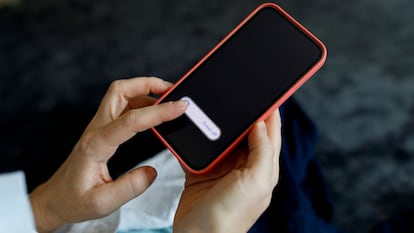Disconnecting from social media for a week can improve mental well-being: It’s time to do a ‘digital cleanse’
Experts recommend taking a break from cellphone use if you find that it is starting to replace life in the real world

Maybe you’re on vacation and your cellphone has no signal, or you forgot to charge your phone and now you’re sitting in a waiting room, anxious to see what’s happening on Twitter or what your friends are doing on Instagram. Feeling uncomfortable when you don’t have your phone in your hand, as if something is missing, is a warning sign: it’s time to disconnect. In most cases, you don’t need to disconnect completely and forever. A week-long break from social media is enough to yield significant improvements in well-being, according to a study published in the journal Cyberpsychology, Behavior and Social Networking in May 2022.
In the long term, taking a break could be a way to manage mental health, because taking a break increases self-control and awareness of the time and energy spent on networks. In addition, people realize all that they can do with their free time, such as taking a walk, seeing family or friends, taking up old hobbies and even discovering new ones. “Your self-esteem starts to improve and your mood changes; you make changes that make you feel better,” said Marian García Arigüel, the director of Orbium, an addiction treatment and detox center in Madrid and Barcelona. The first step of a digital cleanse is to be aware of and accept the need for a change in behavior. Then comes the hardest part: doing it.
Addiction versus a bad habit
Although many people use the word addiction to refer to their difficulty in limiting cellphone usage, it is actually a spectrum disorder ranging from mild to severe, and treatment may require professional help, therapy and a long break. Public health psychologist José Tamayo Hernández explained that, in order to distinguish problematic or addictive use of social media from normal behavior or mere bad habits, we must determine whether it causes “intense psychological discomfort,” a negative impact on our personal relationships, work, studies or the abandonment of leisure activities.
Some of the warning signs that indicate the need for a change in behavior include checking social media as soon as you get up, before you go to bed or when you wake up during the night; typing or looking at posts while doing another activity, such as eating, walking or conversing face-to-face with another person; or repeatedly checking for new notifications or responses on social media. But these indications don’t always mean that there’s a major problem. “It is not possible to identify addiction to social media, or any other addiction, with objective criteria, such as the number of hours one dedicates to an activity each day,” Tamayo Hernández said. He went on to provide some examples of what an addiction to social networks may look like: “When the user is not able to control his/her access, feels compelled to do it every time s/he feels the urge or has the opportunity to do so, and when [the activity] leads to not fulfilling obligations, commitments and plans, or causes social isolation and the abandonment of face-to-face communication,” there’s a serious problem. García Arigüel added that cases of addiction often imply a decrease in cognitive functions, like attention span and concentration.
Another symptom that the bad habit has become a disorder is when a person feels nervous, irritable or frustrated when they cannot access the Internet, either because it does not work or goes slower than usual, or if these psychological states occur when they receive few likes or comments on social media. At that point, it becomes a question of self-esteem.
Gabriel Pozuelo, a psychologist who has worked on addiction and social media problems since 2018, explained that, generally speaking, people attach too much importance to the number of likes and followers they have on social media. That is not a specific symptom of addiction per se, but being obsessed with such numbers can indicate a problem. “We would have to investigate why such social approval is needed. We can’t have our self-esteem depend on [our] number of ‘likes,’” Pozuelo emphasized.
Excessive worry about posting every day can also be indicative of a more serious issue. In most cases (except in situations when a person is using social media for professional purposes), the perception that one must serve an audience is unrealistic. “For these types of users, we recommend that they decrease their [social media] activity. Maybe it will take some time to get accustomed to it, because they used to do it so often. But you have to find a balance with your private life. At the end of the day, social media must be treated like a window that can open, not the main entrance,” said the psychologist, who works with social media influencers who have difficulty establishing boundaries between their personal and professional lives.
He explained that the main challenge this group faces is handling criticism. To address it, he recommends a change in perspective and attaching less importance to “the nice things” that are said on social media: “Reading positive comments is always good for you, it boosts your ego a little bit, but we don’t have to attach too much importance to it. When you start to care less about the positive things people say to you on social media, [then] the negative things start to affect you less (...) In the end, you are valuing social media less.”
What to do to fix excessive use
Jumping from video to video, from post to post, from one social media site to another for hours, without even remembering what you’ve watched, read or seen in the last few minutes, is an example of going on autopilot; you’re unaware of the content you see. “Most people say, ‘I’m not hooked, that doesn’t happen to me,’” Pozuelo said. But he assured that most people are startled after they look at the amount of time they spend on social media: “Sometimes we don’t spend a lot of time [at once], but we do it many times a day.” That’s why he recommends installing apps that monitor usage time and alert you upon reaching a specific time limit. To prevent the cell phone from becoming an extension of your hands, he advises keeping the cell phone out of reach during the day by leaving it in another part of the house. At night, he recommends replacing cellphone use with another activity, like reading a book or listening to music, at least one hour before going to sleep.
In addition, José Tamayo Hernández emphasized the importance of not using cellphones, or any electronic devices, when engaged in activities like eating, walking, watching television or chatting with another person. He also suggested disabling automatic notifications that are not strictly necessary, as well as uninstalling apps, deleting conversations and leaving unnecessary group chats.
Disconnecting from social media to connect with real life
Recently, mental health experts have noticed an increase in people’s desire and even need to disconnect from social media. “Not just in patients, but colleagues, family members and myself,” acknowledged Tamayo Hernández, who has been working in this field since 2004. Marian García Arigüel agreed that interest in establishing these limits is increasing gradually, although it is still difficult to put it into practice. For people who want to establish rules and use their cell phone more mindfully, the expert recommends setting up two-hour intervals in which to use the cellphone freely, and then during breaks, going for a walk, doing hands-on activities and, above all, re-establishing personal connections, such as chatting with friends in person, without having your phone in hand.
For his part, Professor Emeritus of Clinical Psychology at Spain’s University of the Basque Country Enrique Echeburúa argued that setting usage limits is “especially positive when there’s an abusive use,” but he recommends it for everyone, even if they are not addicted: “You have to disconnect from social media to connect with real life, because it is all a matter of time.”
Sign up for our weekly newsletter to get more English-language news coverage from EL PAÍS USA Edition
Tu suscripción se está usando en otro dispositivo
¿Quieres añadir otro usuario a tu suscripción?
Si continúas leyendo en este dispositivo, no se podrá leer en el otro.
FlechaTu suscripción se está usando en otro dispositivo y solo puedes acceder a EL PAÍS desde un dispositivo a la vez.
Si quieres compartir tu cuenta, cambia tu suscripción a la modalidad Premium, así podrás añadir otro usuario. Cada uno accederá con su propia cuenta de email, lo que os permitirá personalizar vuestra experiencia en EL PAÍS.
¿Tienes una suscripción de empresa? Accede aquí para contratar más cuentas.
En el caso de no saber quién está usando tu cuenta, te recomendamos cambiar tu contraseña aquí.
Si decides continuar compartiendo tu cuenta, este mensaje se mostrará en tu dispositivo y en el de la otra persona que está usando tu cuenta de forma indefinida, afectando a tu experiencia de lectura. Puedes consultar aquí los términos y condiciones de la suscripción digital.









































